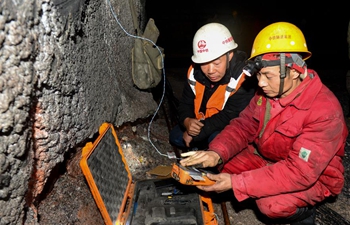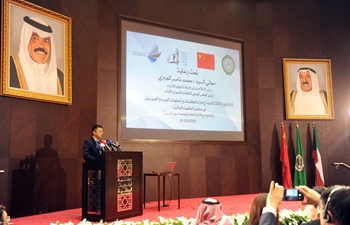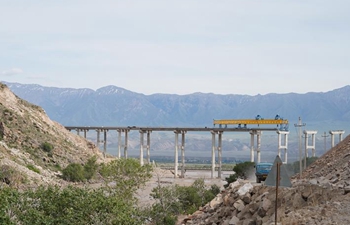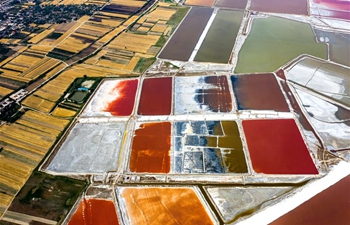by Dana Halawi
BEIRUT, June 12 (Xinhua) -- Local analysts hold different views on the motives behind the U.S. keenness to solve the dispute over maritime borders between Lebanon and Israel.
"The U.S. companies want a share in the oil and gas market in Lebanon. The U.S. wants to convey the message that Lebanon's oil and gas sector is under the U.S. power, instead of under the influence of Russia or Turkey," Sami Nader, director of Levant Institute for Strategic Affairs in Lebanon, told Xinhua.
Nader explained that the Americans were mad after Russian energy company Rosneft signed a contract with the Lebanese Energy Ministry to manage oil storage terminals in Lebanon's Tripoli for 20 years.
"The United States believes that Russia's involvement in oil and gas sector in the region should be limited to the Lebanese-Syrian borders without getting any deeper into Lebanon," he said.
Nader believed that the United States has moved faster to mediate in the dispute over maritime borders between Lebanon and Israel after Russia's success, in February 2018, in joining a consortium of three companies for the first offshore oil and gas exploration in Lebanon for blocks 4 and 9.
In February 2018, Lebanon signed its first offshore oil and gas exploration and production contracts for energy blocks 4 and 9 with a consortium including France's Total, Italy's Eni and Russia's Novatek.
Earlier this year, Lebanon launched its second licensing round for offshore oil and gas exploration in five blocks.
Lebanon has an unresolved maritime border with Israel that involves a triangular sea area of about 860 square km extending along the edge of three of its 10 offshore energy blocks.
The United States has mediated between Lebanon and Israel in the past to end the dispute over maritime borders but failed to reach any positive results.
Over a month ago, the United States has reactivated its efforts in solving maritime disputes between Lebanon and Israel through multiple visits by U.S. Assistant Secretary of State for Near Eastern Affairs David Satterfield to both countries.
Political analyst Rafic Nasrallah agreed with Nader, arguing that the Americans have reactivated their efforts because they are interested in the oil and gas exploration in Lebanon.
However, he added that the United States has also increased its efforts lately because Israel prefers to reach a deal in this regard to avoid any possible confrontations with Hezbollah.
"Israel fears confrontation with Lebanon's Hezbollah which will affect the transportation of gas from Israel to Europe and the operation of insurance companies in the field of oil and gas in Israel," Nasrallah said.
Meanwhile, Hilal Khashan, chair of the Political Studies Department at the American University of Beirut, believed that the United States increased pressure on the matter of maritime disputes between Lebanon and Israel because it wants to maintain stability in Lebanon.
"The United States does not want military confrontation in the region, neither does it want to create a situation where Hezbollah might feel compelled to attack Israel and create a situation of war," he said.
He added that the United States believes it has many good allies in Lebanon that can offset the influence of Hezbollah.
"The United States invests in the Lebanese army, as it believes that it has allies in Lebanon and that these allies are needed to offset the power of Hezbollah," he said.
However, he did not believe that the United States has interests in Lebanon's oil and gas market.
"This would be an interest for European markets. The U.S. has no interest in gas in eastern Mediterranean and it is not about competition between U.S. and Russia over oil in Lebanon," he said.
The United States has previously suggested a solution to the dispute by proposing the so-called Frederick Hoff line, which gives Lebanon 60 percent of the offshore oil Block 9 while giving Israel 40 percent.
However, Lebanese officials rejected the proposal, adding that Lebanon insists on its rights of owning all its oil and gas wealth that Israel is trying to steal.
Analysts interviewed by Xinhua were not particularly optimistic about the possibility to reach an imminent solution that is in favor of Lebanon.
"I am not too optimistic about Satterfield's initiative. He did not give any assurance that Israel would accept Lebanon's right of the disputed 860-square-km area. Satterfield only said that there was a positive atmosphere," Nasrallah said, adding that Lebanon will probably get two thirds of the area only.
According to Khashan, it will take time to reach a deal over the disputed maritime borders as negotiations are slow.
He also believed that Lebanon can probably get 300 square km of the disputed area, instead of the whole area, since there is a balance of power in the region and Lebanon cannot emerge as winner.
"It is in Lebanon's interest to solve this issue because block 9 is the most promising block in Lebanon's Exclusive Economic Zone, while Israel has other important gas fields such as Tamar," he said.
Meanwhile, Nader feared that the maritime borders issue may be used by Iran as a pressure point in its conflict with the United States.
"Anything that is related to Israel in the region should be discussed with Iran through its proxy in Lebanon Hezbollah," Nader explained.

















